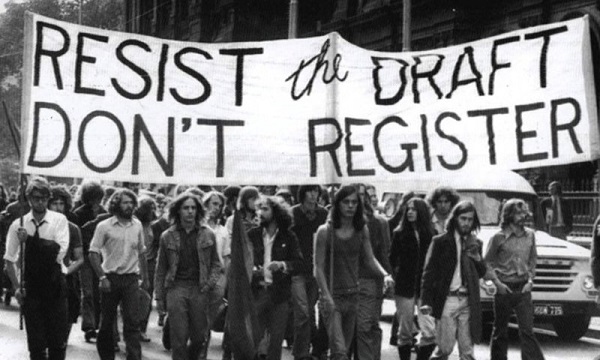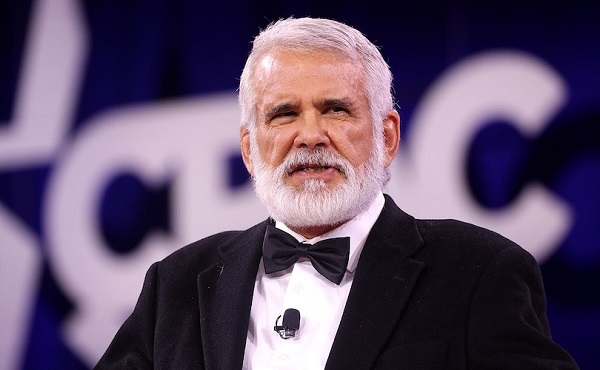Opinion
Left Turn: How Viet Nam War Resisters Changed Canada’s Political Compass

“Politics is downstream of culture”— Andrew Breitbart
Canada has long desired its own foreign policy independent of neighbouring America. So the news that Canada and communist China are the only partners in resisting Donald Trump’s call for tariff negotiations was good news indeed for Trudeaupia. With former RCMP officers alleging that nine Liberal members of Parliament were colluding with China, the pivot seems confirmed.
How average Canadians feel about this will largely depend on whether they are extremely gullible or, like the Norwegian Blue parrot, just resting. But if we use the current Liberal strategy of resurrecting Gordie Howe’s elbows as a rallying cry option one seems increasingly likely.
Norman Bethune notwithstanding, Canada wasn’t always passionate about aligning with the China of Mao or Zhao Enlai For most of its history until the 1960s, Canada was a small C conservative nation of resource development, small businesses and loyalty to the Crown (the Queen, not the TV show). Sure, it took in TV producers and hosts targeted by the 1950s Hollywood Black list. But as Mark Carney will tell you, Canada’s TV stars of the day were Mr. Dressup and Friendly Giant. Not radical.
Most Canadians sneered quietly at U.S. pretensions and their military. But Canadian politics suddenly pivoted left in the 1960s, from genial Mike Pearson to Pierre “The Rake” Trudeau. In Pearson’s day it was a national scandal that a Canadian cabinet minister slept with a German woman who also shared a pillow with a Soviet official. In Trudeau’s day it was a scandal if he didn’t sleep with Barbra Streisand after their date.
The main factors shoving Canada left were A) Quebec separation and B) the Viet Nam War from 1963-1975. Quebec’s rejection of the Church in favour of a secular state got most of the ink, producing Trudeau himself, René Levêsque and an unending series of federal/ provincial dog piles. The result is a self-satisfied Quebec and a ROC whose attitude on Quebec has flipped from fraternal twin to very reluctant landlord.
But the impact of B) on Canada was profound and continues today with the leftward bias in Canada’s cultural and media outlook. Specifically, the total of American citizens who moved to Canada due to their opposition to the war ranges from 50,000 to 100,000— at a time when Canada’s population was approximately 20 million. The common denominator for almost all the emigrés was a defiant opposition to America’s compulsory draft system for young men that remained in place till 1972.
The most famous objector was probably boxer Muhammad Ali who demanded conscientious objector status, losing five years of his career while fighting prison as a draft dodger. At least Ali got to stay home.

Others headed north. Some of the new Canadians were draft dodgers, others were deserters. Many were educated middle-class to upper class young men who objected to the War. Chris Turner in the Walrus has described it as “the largest politically motivated migration from the United States since the United Empire Loyalists moved north to oppose the American Revolution.”
After initially rejecting deserters, Canada under Trudeau in 1969 agreed not to ask the draft status of the newcomers. They were allowed to reside in Canada, and many stayed permanently even when the U.S. declared clemency for them. As befits their political leaning in rejecting the War, many later became involved in progressive causes, academia and the arts.
If you hold with Breitbart’s theory that politics is downstream of culture you can see their progressive effect on Canada’s politics and culture. A sample of transplanted Americans includes author William Gibson, politician Jim Green, gay-rights advocate Michael Hendricks, author Keith Maillard, playwright John Murrell, television personality Eric Nagler, broadcaster Andy Barrie, film critic Jay Scott, sportswriter Jack Todd and musician Jesse Winchester. (In our own 1970s education several of our professors at U of T were prominent draft dodgers.)

When Viet Nam disappeared as a cause for Canadians, this leftist cohort championed progressive causes such as socialism, gay rights, feminism, race issues and social sciences. Their critical perspective on American conservative figures such as Richard Nixon, Ronald Reagan, George W. Bush and now Donald Trump guided Canadian attitudes. Media increasingly tilted leftward.
Woke Canadians now think that if you give people safe places to inject their drugs they’ll eventually heal themselves. They also believe if you take away the legal guns in society this will protect them from random violence. They think that wishing to be female is enough to allow men to compete in women’s sports. It’s government by PBS. If you want to see the bias at work you needed only see the high dudgeon of Canada’s “approved media” when conservative social media sites peppered the leaders after the French language debate Wednesday.
The recent Liberal Party Team Canada propaganda war— featuring longtime U.S. exiles Mike Myers and Neil Young ripping Trump’s tariffs– is just the latest in a cultural war against America. However, there seems for the first time in a long time to be pushback against this entrenched attitude of privilege. The state’s patronage of CBC has been a popular element of Pierre Poilievre’s platform. The publication of polling favourable to Liberals— after legacy pollsters in the U.S. distorted the 2024 election— is being questioned.
One popular mainstream media narrative concerns how Pierre Poilievre “lost” a 20-point lead in the polls from last November— the insinuation being Canada is rejecting him. But a fair reading of the polls is that the NDP under Mr. Rolex, Jagmeet Singh, has bled as much as ten points to the Liberals. In addition the Bloq support in Quebec is dropping due to soft separatists fearing assimilation by Trump’s America.
The debates of the past two nights show just how desperately the Laurentian elites are clinging to power when around the western world their pals are being booted. They’ll support the anodyne banker and court more years of Liberal chaos if it buys them peace in their gated suburbs. And deny that any of this pleases the ruling class back in China.
Bruce Dowbiggin @dowbboy is the editor of Not The Public Broadcaster A two-time winner of the Gemini Award as Canada’s top television sports broadcaster. His new book Deal With It: The Trades That Stunned The NHL And Changed Hockey is now available on Amazon. Inexact Science: The Six Most Compelling Draft Years In NHL History, his previous book with his son Evan, was voted the seventh-best professional hockey book of all time by bookauthority.org. You can see all his books at brucedowbigginbooks.ca.
conflict
One dead, over 60 injured after Iranian missiles pierce Iron Dome

 MxM News
MxM News
Quick Hit:
Iran launched four waves of missile attacks Friday night, breaching Israel’s defenses and killing at least one person. Over 60 others were injured, with the IDF confirming direct strikes on civilian areas in Tel Aviv and central Israel.
Key Details:
-
The Israel Defense Forces reported four rounds of Iranian missile fire, with at least ten missiles making impact inside Israel.
-
One person was killed and 63 wounded, including several in critical condition, according to The Jerusalem Post.
-
The IDF said Iran deliberately targeted civilians, contrasting its own earlier strikes that focused on Iranian military assets.
⚠️RAW FOOTAGE: Iran launched multiple ballistic missiles toward Israel in the past hours.
The IDF cannot, and will not, allow Iran to attack our civilians. pic.twitter.com/IrDK05uErm
— Israel Defense Forces (@IDF) June 13, 2025
Diving Deeper:
Several Iranian missiles broke through Israel’s air defenses during Friday night’s attack, striking Tel Aviv and other civilian areas. According to The Jerusalem Post, at least 63 people were wounded and one person was killed after four waves of Iranian ballistic missile strikes hit cities across Israel.
The IDF reportedly said roughly 100 missiles were fired in total. While the Iron Dome intercepted many, multiple missiles made it through and exploded in densely populated areas. Dramatic video showed a missile striking near downtown Tel Aviv, sending fire and debris into the air as people ran for cover.
Army Radio confirmed that ten missiles landed inside Israel between the first two waves. By the time the third and fourth waves hit, injuries had climbed sharply, with several listed in critical condition. The one fatality was reported late Friday night.
The Israeli Home Front Command temporarily allowed civilians to exit shelters but quickly reversed that guidance, urging residents to stay near protected areas amid fears of further attacks.
The IDF emphasized the nature of the targets, calling out Iran for targeting civilians. The IDF also released maps showing where air raid sirens were triggered throughout the night. Though Israel’s Home Front Command briefly allowed civilians to exit shelters, it advised them to remain nearby in case of continued strikes. As of late Friday, Iranian officials claimed a fifth wave could follow.
With tensions still high, Israeli defense officials are preparing for potential further escalation—and weighing how to respond to a direct Iranian attack on civilians.
Fraser Institute
Long waits for health care hit Canadians in their pocketbooks

From the Fraser Institute
Canadians continue to endure long wait times for health care. And while waiting for care can obviously be detrimental to your health and wellbeing, it can also hurt your pocketbook.
In 2024, the latest year of available data, the median wait—from referral by a family doctor to treatment by a specialist—was 30 weeks (including 15 weeks waiting for treatment after seeing a specialist). And last year, an estimated 1.5 million Canadians were waiting for care.
It’s no wonder Canadians are frustrated with the current state of health care.
Again, long waits for care adversely impact patients in many different ways including physical pain, psychological distress and worsened treatment outcomes as lengthy waits can make the treatment of some problems more difficult. There’s also a less-talked about consequence—the impact of health-care waits on the ability of patients to participate in day-to-day life, work and earn a living.
According to a recent study published by the Fraser Institute, wait times for non-emergency surgery cost Canadian patients $5.2 billion in lost wages in 2024. That’s about $3,300 for each of the 1.5 million patients waiting for care. Crucially, this estimate only considers time at work. After also accounting for free time outside of work, the cost increases to $15.9 billion or more than $10,200 per person.
Of course, some advocates of the health-care status quo argue that long waits for care remain a necessary trade-off to ensure all Canadians receive universal health-care coverage. But the experience of many high-income countries with universal health care shows the opposite.
Despite Canada ranking among the highest spenders (4th of 31 countries) on health care (as a percentage of its economy) among other developed countries with universal health care, we consistently rank among the bottom for the number of doctors, hospital beds, MRIs and CT scanners. Canada also has one of the worst records on access to timely health care.
So what do these other countries do differently than Canada? In short, they embrace the private sector as a partner in providing universal care.
Australia, for instance, spends less on health care (again, as a percentage of its economy) than Canada, yet the percentage of patients in Australia (33.1 per cent) who report waiting more than two months for non-emergency surgery was much higher in Canada (58.3 per cent). Unlike in Canada, Australian patients can choose to receive non-emergency surgery in either a private or public hospital. In 2021/22, 58.6 per cent of non-emergency surgeries in Australia were performed in private hospitals.
But we don’t need to look abroad for evidence that the private sector can help reduce wait times by delivering publicly-funded care. From 2010 to 2014, the Saskatchewan government, among other policies, contracted out publicly-funded surgeries to private clinics and lowered the province’s median wait time from one of the longest in the country (26.5 weeks in 2010) to one of the shortest (14.2 weeks in 2014). The initiative also reduced the average cost of procedures by 26 per cent.
Canadians are waiting longer than ever for health care, and the economic costs of these waits have never been higher. Until policymakers have the courage to enact genuine reform, based in part on more successful universal health-care systems, this status quo will continue to cost Canadian patients.
-

 Health2 days ago
Health2 days agoRFK Jr. appoints Robert Malone, Martin Kulldorff, other COVID shot critics to overhauled CDC vaccine panel
-

 Alberta2 days ago
Alberta2 days agoOil prices are headed for a hard fall
-

 Business2 days ago
Business2 days agoOur addiction to dairy supply management is turning Canada into a trade pariah
-

 Business2 days ago
Business2 days agoThe carbon tax’s last stand – and what comes after
-

 conflict1 day ago
conflict1 day agoIsrael strikes Iran, targeting nuclear sites; U.S. not involved in attack
-

 Business2 days ago
Business2 days ago84% of Swiss hospitals and 60% of hospitalizations are in private facilities, and they face much lower wait times
-

 Bruce Dowbiggin2 days ago
Bruce Dowbiggin2 days agoCanadians Thinks America Owes Them. Trump Has Other Ideas
-

 Business1 day ago
Business1 day agoTrump: ‘Changes are coming’ to aggressive immigration policy after business complaints






